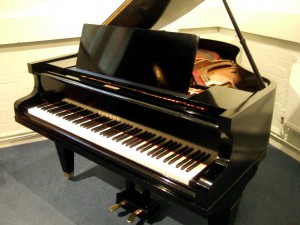Finding the Ideal Spot For Your Piano
When you buy a piano, you’ll probably have a good idea where you want to put it. Most customers have already taken into account the space they have available in their home. And for the vast majority, it’s immediately obvious whether they have the space for a grand piano or whether an upright piano will be a more comfortable fit.
But as well as the piano’s size, there is a range of other factors to take into account when selecting a position for your piano.
Heat and Moisture
Extreme conditions affect the lifespan of a piano and can cause internal and external damage. In some cases, the wrong conditions (or conditions that change often) could cause your piano to require more frequent tuning appointments.
First, make sure your piano isn’t subjected to direct sunlight, since it can fade the finish, warm up the case and cause cracks and warping. Also, avoid excessive humidity: the piano will last longest when kept at normal room temperature without an extremely dry or damp atmosphere. Piano Workshop staff can advise you on measuring humidity and correcting the environment with an inexpensive humidifier.
You should also avoid placing the piano near any source of extreme heat or cold. That means positioning it away from radiators, storage heaters, windows or fires.
Sudden changes in the temperature and humidity should also be avoided, so try not to move your piano from room to room once it has been delivered. Ideally you should have the ideal spot in mind before it’s loaded off the delivery truck.
Noise Concerns
Upright pianos are less bassy than grand pianos, but the noise from an upright could still be a concern for neighbours, housemates and other family members. There are two ways to avoid troubling others when you play.
- The simplest way to cut down on noise pollution is to avoid placing the back of an upright piano against any internal walls. Of course, in some properties this doesn’t leave you with many options.
- A more advanced solution to noise complaints is a silent piano system. Silent pianos are acoustic pianos fitted with special mechanisms that can silence the strings when activated. You can then listen to your piano through headphones. Silent pianos give you all the expression of a piano with all the benefits of an electronic system.
If you’d like advice about silent pianos, you can try one out at our Reigate showroom.
Moving a Piano to a New Location
If you’re moving house or need to transport your piano for any reason, use a specialist piano removal company, not a general house removal firm. Impact can damage your piano’s finish, and it will also cause the piano to go out of tune. Serious knocks and bangs can cause damage to the internal mechanisms.
Remember: pianos are strong enough to last a lifetime if they’re treated well. You can protect your investment and prolong the life of your piano by positioning it in the right spot from day one.


